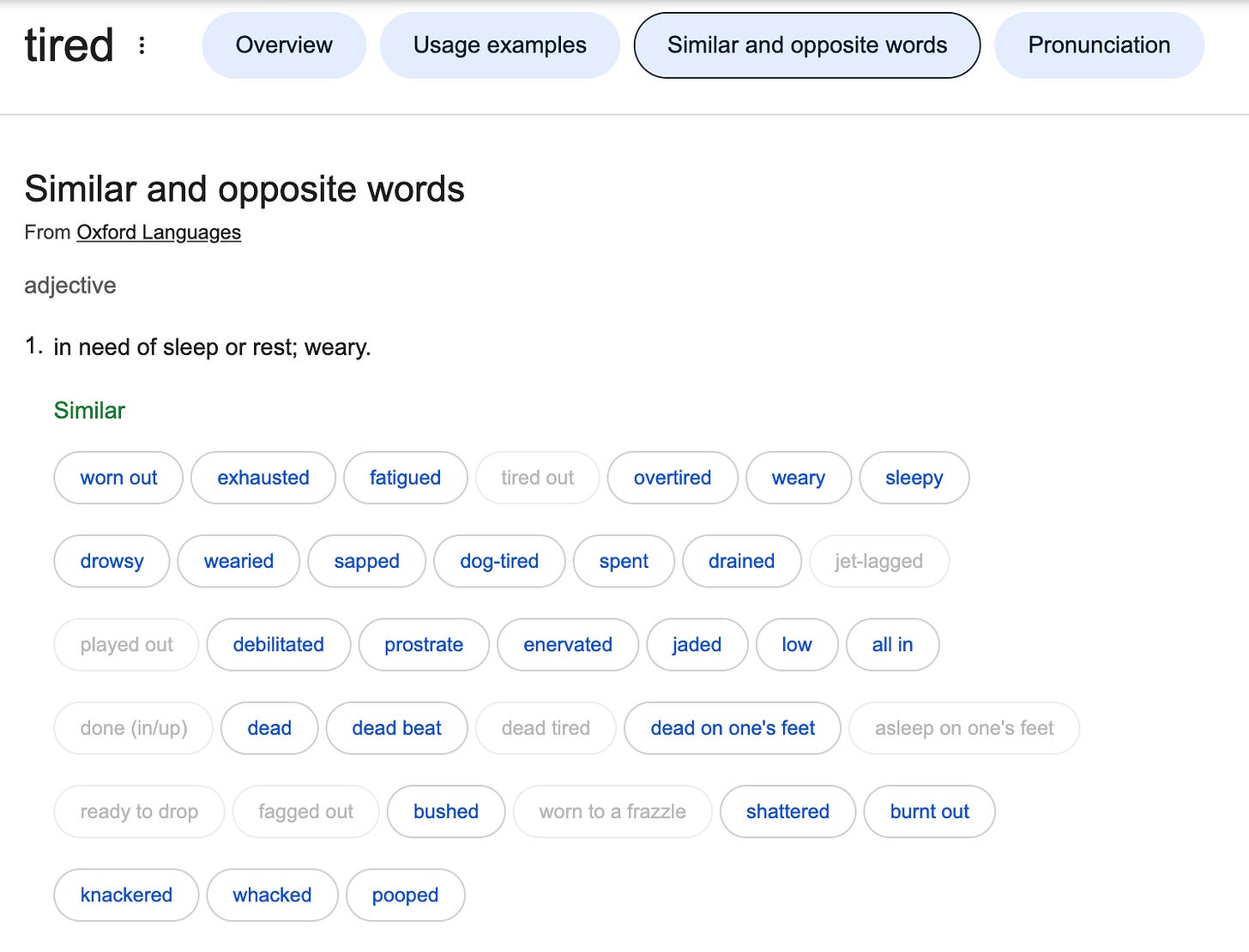The word I want is not there. This used to happen to me a lot more when I was younger, when I was still coming into myself as a writer and thinker. Not as much these days, and so it’s a surprise when it happens.
The word I want is not tired – mothers with young children are tired, activists on social media are tired, adverbs and the Chosen One trope are tired. Such use of tired implies an undercurrent of annoyance, maybe even anger. I am not tired – although that was the word I used when I was younger to talk of the feeling that came after pushing my muscles to the brink, when my legs and arms would shake but I couldn’t keep the smile off my face.
The word I want is not drained – people with jobs they hate are drained, introverts who had to go to a party or a family wedding are drained. Drained implies a depletion that’s irreversible, as if the energy of the universe is finite, rather than infinitely convertible and always rebalancing. Drained implies involuntary emptiness, rather than what I feel when I have completed a project (e.g. a novel) to which I willingly gave my all, knowing that my creative juices will replenish again, and again, and again.
The word I want is not beat – for obvious reasons. Not so obvious? Beat encodes binary thinking. There is the beater and the beaten, the world a place of malice and violence against which the individual asserts themselves and is either triumphant or beaten, beat down. Beat is not how I would describe the stillness before the next wave, the calm of an excruciatingly hot summer day before a rainstorm, the knowledge that this moment is temporary, and necessary, part of the endless cycle of change.
The word I want is none of these things:
If I were to go around telling people I know that I felt any of the things above, they would likely be surprised. Given past experience, they’d likely say, “But you’re never tired!” or try to placate me that “Even at 50% you’re more productive than most people.” Even a stranger would react with concern or worry, or at least sympathy, and possibly try to solve the problem. But what I feel right now is not a problem to be solved. It is the solution.
It is because I can let myself get properly, wonderfully tired, that I have the energy that I do. I have not done any writing this week, because I need a break before I can jump from one novel to the next. This is not a cause for concern. Earlier, I took a short break from my flute lessons to focus completely on editing a novel. Now, I’m just enjoying the flute, without worrying about writing at all. The writing will happen. In the meantime, there’s just joy.
A friend shared this Susan Sontag quote a while ago and I’ve been thinking about it ever since:
“It’s not ‘natural’ to speak well, eloquently, in an interesting articulate way. People living in groups, families, communes say little—have few verbal means. Eloquence—thinking in words—is a byproduct of solitude, deracination, a heightened painful individuality.” — Susan Sontag
It is exactly this use of “deracination” that is behind my pen-name: deracine. To communicate as translator, across contexts and communities, requires that you both know what particular words mean to particular people, but don’t accept that meaning as objective reality. You can lift words out of their historical context to dust them off and see what remains. Excavating this etymology is both an act of belonging and individuation – you see what the word means to others and can use it that way, or choose not to when it no longer makes sense.
To be deracine also means to live across languages, and so it’s no trouble to look for the word I actually want elsewhere. Do I want abbiocco from the Italian, which is the sleepy contentedness after a good meal (that has none of the implied illness of a food coma)? Do I want meraki from the Greek, which means to pour the essence of a soul into a creative endeavor for a sense of happy satisfaction?
Why do we not have a word for exhaustion that doesn’t have negative connotations? What does it say about the value of rest and recovery in Western society? Or maybe we do have the word I’m looking for, and you can tell me what it is.
Writer’s Corner
Sharing some of the things that have been helping me lately, in case they’re of interest:
A referral link for a free month of NovelPad, which is proving really helpful to me in plotting a thriller.
Jane Friedman’s free newsletter, Electric Speed, which always contains useful tips and resources for writers.
Tiffany Yates Martin’s writing courses, which are about $50 each, and well worth it. I took her course on depicting characters’ inner lives and was blown away.




I love your search for words. Seems like the right ones are not quite present when you need them. Maybe you could create a new language with all the beautiful words that exist in other languages and compose a new universal language? The flute sound is full of joy!
I really like meraki.
Personally, the closed notion I have is to be “subsumed”, meaning I’m so consumed with something I’m doing, making, feeling…that I become one with it or enveloped into it. But I use it in a good way, it’s usually a positive experience.
And then, of course as it’s done or I work through the thing or feeling, then we separate Back to our own entities.
There is less of a notion of tired, but still the notion that that thing is monopolizing and subsuming me at the moment, until I return back to my normal state.